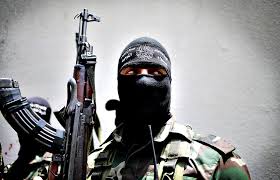militant
英 [ˈmɪl.ɪ.tənt]
美 [ˈmɪl.ə.tənt]
- adj. 好战的
- n. 富有战斗性的人;好斗者;激进分子
使用频率:

记忆方法
将“militant”分解为“milit”和“-ant”。想象“milit”像军人一样行走(“mil”是军事的缩写),而“-ant”表示形容词后缀,意味着“像……一样的”。所以,记忆方法是想象一个像军人一样积极、激进的人,这样就能记住“militant”表示具有激进或好战性质的人或态度。
以上内容由AI生成, 仅供参考和借鉴
中文词源
militant 好斗者,好战的,激进的
来自military,军事的,军队的,-ant,人。引申词义好斗者,好战的,激进的等。
英语词源
- militant (adj.)
- early 15c., "fighting, engaged in warfare," from Middle French militant "fighting," from Latin militantem (nominative militans), present participle of militare "serve as a soldier" (see militate), originally especially in Church militant. Related: Militantly.
- militant (n.)
- "one engaged in war or strife," c. 1600, from militant (adj.); in a political sense, it is attested by 1907.
权威例句
- 1. The fiery right-wing leader toned down his militant statements after the meeting.
- 言辞激烈的右翼领袖在会后收敛了他的好战言论。
- 2. They have already been accused of appeasement by more militant organisations.
- 已有更多的好战组织谴责他们采取姑息态度。
- 3. The party threw out the Trotskyist Militant Tendency.
- 该党开除了托洛茨基主义的激进派。
- 4. We were accused of being militant left-wingers.
- 我们被人指责是好战的左翼分子。
- 5. Some militant leaders want to merge with white radicals.
- 一些好斗的领导人要和白人中的激进派联合.
